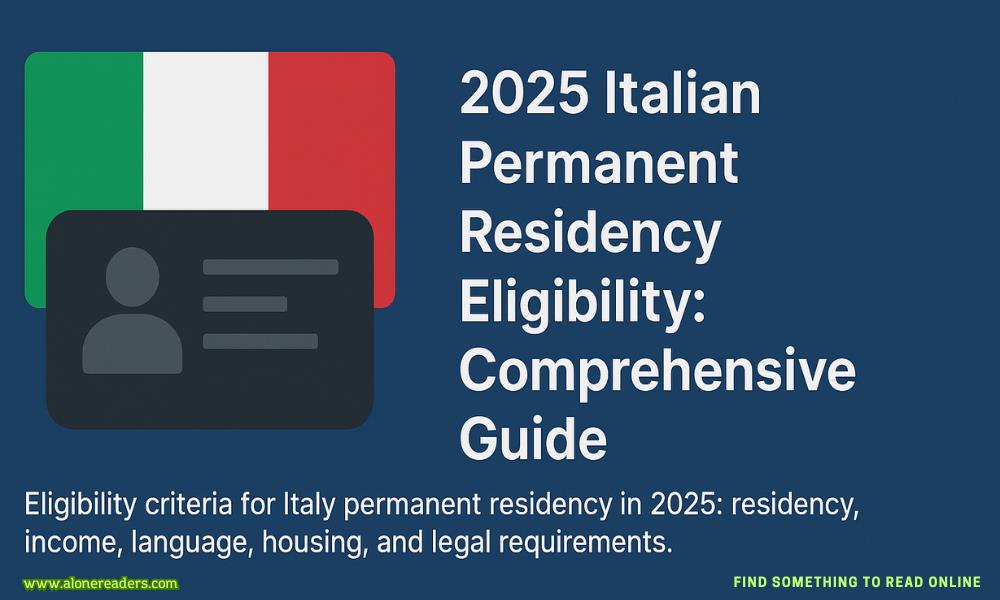
Becoming a long-term resident in Italy—a non‑EU citizen’s pathway to near‑indefinite stay—requires satisfying a finely structured set of legal, financial, linguistic, and moral conditions. This guide dives deeply into each criterion specific to 2025, drawing on updated legislative standards, judicial interpretations, and governmental indices to equip you with a complete picture of who qualifies—and who doesn’t—for the EU long‑term residence permit (Carta di soggiorno UE per soggiornanti di lungo periodo).
Italy's permanent residency permit — officially known as the EU long-term residence permit — is a coveted document that grants third-country nationals long-term stability and almost full parity with Italian citizens in terms of employment and social services. But the process of qualifying for it in 2025 requires more than just time spent in the country.
The following is a precise breakdown of what applicants must meet to become eligible, based strictly on current Italian immigration law and procedures. This is not a surface overview; it is a deep, structured guide built for those serious about securing their legal future in Italy.
Legal residence requirement:
To qualify, you must have continuously and legally resided in Italy for at least five years. This does not mean simply being present in the country—it must be under valid residence permits. Short breaks of a few weeks abroad are allowed, but any single absence longer than six consecutive months or multiple absences exceeding ten months total over the five years can disqualify you.
Important details:
You must apply while holding a valid, unexpired residence permit (permesso di soggiorno). If your permit has expired or is pending renewal without documentation, your application may be rejected outright. The following types of permits are eligible:
Permits not eligible include:
Income threshold:
You must prove that your annual gross income is at least equivalent to the Italian government’s social allowance level. For 2025, this amount is approximately €7,000 per year for a single applicant.
For family members:
The required income increases if you have dependents:
Accepted income sources include:
Unacceptable sources:
You must present evidence via recent payslips, a job contract, and the most recent tax return.
You must demonstrate that you have legal, suitable, and compliant housing in Italy. This does not simply mean having a place to sleep—it must meet local housing standards in terms of space, sanitation, and occupancy limits.
Acceptable proof includes:
Key point: You must also be legally registered at the address (residenza anagrafica). If you live with others, you may be asked to prove you have adequate personal space (usually measured in square meters per person).
One of the most critical conditions is having a clean criminal record. Italy's immigration authorities check not only for convictions within Italy but also from your country of origin.
Disqualifying factors include:
Even minor infractions could delay or complicate your application, depending on the region. Inconsistent answers or undisclosed convictions may result in permanent denial.
In 2025, all applicants (with very few exceptions) must prove that they possess at least A2 level proficiency in the Italian language.
Accepted proof:
Exemptions may apply to:
While this is less measurable than income or housing, Italian authorities consider your general integration into society. This includes:
Some regional offices may request documentation showing integration efforts—language course certificates, community participation, or letters from employers.
Before applying, make sure you have:
Step-by-step:
Once approved, you receive a biometric card valid for 10 years, renewable indefinitely.
Once you secure permanent residency, you are granted:
You are also allowed to reside and work in some other EU countries—though each country may impose its own conditions.
Final Thoughts
Italy’s permanent residency is not granted lightly. It’s designed for those who have not only stayed long enough but also integrated responsibly and contributed lawfully to society. The criteria in 2025 emphasize stability, transparency, and participation in Italian civic life. If you meet the requirements and can back them up with documents, your application stands a strong chance of approval.